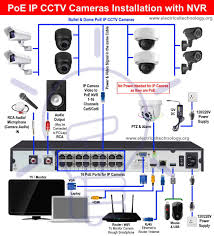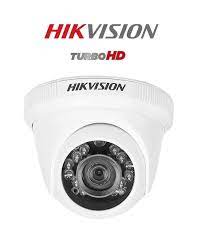Network Video Recorder (NVR) Camera System: A Comprehensive Overview
Network Video Recorder (NVR) camera systems have revolutionized the way we monitor and record video footage for security and surveillance purposes. These advanced systems offer a range of features and benefits that make them an ideal choice for both residential and commercial applications.
One of the key advantages of NVR camera systems is their ability to record high-definition video footage from IP cameras. Unlike traditional analog CCTV systems, which require separate cables for video, audio, and power, NVR systems use a single network cable to connect cameras to the recorder. This simplifies installation and reduces cable clutter, making it easier to set up a comprehensive surveillance network.
Furthermore, NVR camera systems offer remote viewing capabilities, allowing users to access live or recorded footage from anywhere with an internet connection. This feature is particularly useful for homeowners or business owners who want to keep an eye on their property while they are away.
In addition to remote viewing, NVR camera systems often come with advanced features such as motion detection, night vision, and mobile alerts. Motion detection allows the system to start recording when movement is detected in a specified area, while night vision enables clear footage in low-light conditions. Mobile alerts notify users via smartphone or email when motion is detected or other events occur, providing real-time updates on security status.
Another key benefit of NVR camera systems is their scalability. Users can easily add additional cameras to their system as needed without having to upgrade the entire setup. This flexibility makes NVR systems a cost-effective solution for expanding surveillance coverage over time.
In conclusion, NVR camera systems offer a range of features and benefits that make them an excellent choice for modern security and surveillance needs. With high-definition recording capabilities, remote viewing options, advanced features like motion detection and night vision, as well as scalability for future expansion, NVR camera systems provide comprehensive monitoring solutions for homes, businesses, and other facilities.
Top 7 Advantages of NVR Camera Systems for Enhanced Surveillance
- High-definition video recording for clear footage
- Single network cable for simplified installation
- Remote viewing capability for monitoring from anywhere
- Advanced features like motion detection and night vision
- Mobile alerts for real-time notifications
- Scalability to easily add more cameras as needed
- Cost-effective solution for expanding surveillance coverage
7 Drawbacks of NVR Camera Systems: What You Need to Know
- Initial setup and installation can be more complex compared to traditional analog CCTV systems.
- Dependence on a stable network connection for optimal performance and remote viewing capabilities.
- Higher initial cost due to the need for IP cameras and network infrastructure.
- Vulnerability to cyber threats if proper security measures are not implemented.
- Limited compatibility with older analog cameras, potentially requiring a complete system upgrade.
- Potential latency issues in live video streaming over the network, affecting real-time monitoring.
- Reliance on electricity for operation, which may pose challenges during power outages.
High-definition video recording for clear footage
High-definition video recording is a standout feature of NVR camera systems, ensuring that every detail is captured with crystal clarity. This pro of NVR systems guarantees that the footage obtained is sharp, detailed, and of superior quality, making it easier to identify individuals, objects, or events in the recorded video. Whether monitoring a residential property or a commercial establishment, the high-definition recording capability of NVR camera systems provides peace of mind by delivering clear and precise footage for enhanced security and surveillance purposes.
Single network cable for simplified installation
The use of a single network cable for installation is a significant advantage of NVR camera systems. Unlike traditional CCTV setups that require separate cables for video, audio, and power, NVR systems streamline the installation process by utilizing a single network cable to connect cameras to the recorder. This not only simplifies the setup but also reduces cable clutter, making it easier and more efficient to establish a comprehensive surveillance network. The simplified installation of NVR camera systems saves time and effort, making them an ideal choice for users looking for a convenient and user-friendly security solution.
Remote viewing capability for monitoring from anywhere
The remote viewing capability of NVR camera systems allows users to monitor their premises from anywhere with an internet connection. Whether you are at work, traveling, or simply away from home, this feature provides peace of mind by enabling real-time access to live or recorded footage on your smartphone, tablet, or computer. With remote viewing, you can stay connected to your security system and respond promptly to any suspicious activity or emergencies, ensuring the safety and security of your property no matter where you are.
Advanced features like motion detection and night vision
The advanced features of motion detection and night vision in NVR camera systems provide enhanced security and surveillance capabilities. Motion detection allows the system to automatically start recording when any movement is detected, ensuring that important events are captured without the need for continuous monitoring. On the other hand, night vision technology enables clear and detailed footage to be captured even in low-light or nighttime conditions, ensuring round-the-clock monitoring and protection. These features not only enhance the effectiveness of surveillance but also provide peace of mind to users by ensuring that their property is well-protected at all times.
Mobile alerts for real-time notifications
Mobile alerts for real-time notifications are a significant advantage of NVR camera systems. This feature allows users to receive instant notifications on their smartphones or via email whenever motion is detected or other events occur within the surveillance area. Real-time notifications enable users to stay informed about potential security threats or incidents, allowing for prompt action to be taken, even when they are away from the monitored location. By providing timely updates, mobile alerts enhance overall security and peace of mind for users, ensuring that they can respond quickly to any situation that may arise.
Scalability to easily add more cameras as needed
Scalability is a significant advantage of NVR camera systems, allowing users to effortlessly expand their surveillance network by adding more cameras as needed. This flexibility ensures that the system can adapt to changing security requirements without the need for a complete overhaul. Whether it’s increasing coverage in a large property or enhancing monitoring in specific areas, the ability to scale up the number of cameras makes NVR systems a versatile and cost-effective solution for evolving security needs.
Cost-effective solution for expanding surveillance coverage
One of the key advantages of NVR camera systems is their cost-effectiveness when it comes to expanding surveillance coverage. Unlike traditional CCTV systems that may require significant investments to add more cameras or upgrade infrastructure, NVR systems offer a scalable solution that allows users to easily expand their surveillance network without breaking the bank. This flexibility not only saves money in the long run but also ensures that users can adapt their security setup according to changing needs and circumstances without incurring excessive costs.
Initial setup and installation can be more complex compared to traditional analog CCTV systems.
Setting up and installing an NVR camera system can present a challenge due to its more complex nature compared to traditional analog CCTV systems. The initial setup may involve configuring network settings, ensuring compatibility between cameras and the NVR, and troubleshooting any connectivity issues that may arise. This complexity can require a higher level of technical expertise, potentially leading to longer installation times and the need for professional assistance in some cases. The learning curve associated with setting up an NVR system may deter some users who prefer a simpler installation process offered by analog CCTV systems.
Dependence on a stable network connection for optimal performance and remote viewing capabilities.
One notable drawback of NVR camera systems is their reliance on a stable network connection for optimal performance and remote viewing capabilities. In situations where the network connection is weak or unstable, the system may experience delays in video streaming, buffering issues, or even complete loss of connectivity. This dependency on a consistent network signal can pose challenges, especially in areas with unreliable internet service or during network outages. Users may find themselves unable to access live footage or recordings remotely when the network connection is compromised, potentially impacting the system’s overall effectiveness in providing real-time surveillance and monitoring.
Higher initial cost due to the need for IP cameras and network infrastructure.
One of the drawbacks of NVR camera systems is the higher initial cost associated with their implementation. Unlike traditional analog CCTV systems that use coaxial cables and analog cameras, NVR systems require IP cameras and a robust network infrastructure for optimal performance. The need for IP cameras, which are typically more expensive than analog cameras, coupled with the requirement for a reliable network setup, can significantly increase the upfront investment required to set up an NVR system. This higher initial cost may pose a barrier for budget-conscious individuals or businesses looking to upgrade their surveillance capabilities.
Vulnerability to cyber threats if proper security measures are not implemented.
One significant con of NVR camera systems is their vulnerability to cyber threats if proper security measures are not implemented. As these systems rely on network connectivity for data transmission and remote access, they are susceptible to hacking and unauthorized access if not adequately protected. Without robust cybersecurity protocols in place, NVR camera systems can be targeted by malicious actors seeking to exploit vulnerabilities in the network or the devices themselves. This poses a serious risk to the privacy and security of the recorded footage and can potentially compromise the overall integrity of the surveillance system.
Limited compatibility with older analog cameras, potentially requiring a complete system upgrade.
One significant drawback of NVR camera systems is their limited compatibility with older analog cameras, which can potentially necessitate a complete system upgrade. While NVR systems are designed to work seamlessly with IP cameras, older analog cameras may not be compatible due to differences in technology and connectivity. This limitation can be a concern for users who have invested in analog camera setups and are looking to integrate them into a new surveillance system. In such cases, the need to replace all existing analog cameras with IP cameras to ensure full functionality can result in additional costs and logistical challenges for users seeking to upgrade their security infrastructure.
Potential latency issues in live video streaming over the network, affecting real-time monitoring.
Potential latency issues in live video streaming over the network can be a significant drawback of NVR camera systems, impacting real-time monitoring capabilities. Due to the reliance on network connectivity for transmitting video data from cameras to the recorder and then to viewing devices, delays or interruptions in the network can result in latency issues. This delay in video transmission can hinder the ability to monitor events as they happen, potentially leading to missed critical moments during surveillance. It is essential for users of NVR camera systems to ensure a stable and high-speed network connection to minimize latency and maintain effective real-time monitoring functionality.
Reliance on electricity for operation, which may pose challenges during power outages.
One significant drawback of NVR camera systems is their reliance on electricity for operation, which can pose challenges during power outages. In the event of a power failure, NVR cameras may cease to function, leading to a temporary loss of surveillance capabilities. This vulnerability could potentially leave properties vulnerable to security breaches or incidents that occur during periods of power disruption. It is essential for users of NVR camera systems to consider backup power options such as uninterruptible power supply (UPS) units or alternative energy sources to ensure continuous surveillance coverage even in the face of electricity interruptions.




